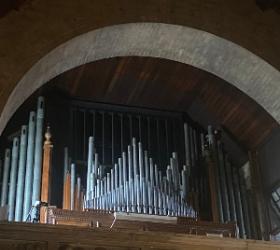
The Bedient crew returned to the University of Iowa in Iowa City, Iowa, this fall to install four organs that were damaged by flooding last year. (See the article, “Floods Damage Organs in Eastern Iowa,” by David C. Kelzenberg, The Diapason, October 2008.) Our recent efforts are the final phase of a massive organ restoration project for the school. In June 2008, the Iowa River poured into the Voxman Music Building, soaking five pipe organs in 18 inches of water: 1986 Taylor & Boody (17 stops), 1971 Schlicker (22 stops), 1961 Holtkamp (5 stops), 1963 Casavant (5 stops), and a 1975 Brombaugh (3 stops). Three of the organs were refurbished in the Bedient shop, while the Taylor & Boody and the Casavant were repaired by their builders.
Because the Iowa River remains a flood threat to the school’s music building, four of the organs were reinstalled by Bedient in new locations. The Brombaugh and Holtkamp organs now reside in the University Capitol Centre. The Schlicker and Taylor & Boody were installed in St. Thomas More Catholic Church, a building that the university currently shares with the congregation. When the church moves to its new facility this winter, the building will be known as Riverside Recital Hall.
Despite languishing in the same amount of river glop, the instruments suffered different levels of damage. The Brombaugh’s lower oak case now includes a combination of refinished and replaced parts, meticulously matched by woodworker Ed Stibal. The bench is new, as are most of the ash/walnut Gedeckt pipes. Miraculously, with Stibal’s help, the original pedalboard survived the ordeal.
Repairs on the Schlicker included refinishing the lower case, renovating or replacing the entire pedal action, and updating other miscellaneous stop action and wind regulation components.
The Holtkamp organ, a renowned “Martini” model, needed substantial work. Initially, we tried to save the oak-veneered, plywood box that enclosed the blower and other mechanicals, but with a clearly delineated water line about 18 inches from the floor and disintegrating casework throughout, new construction was unavoidable. Although other water-damaged items such as the bench and pedalboard had to be replaced, the organ’s red oak keydesk was refurbished and the original key action retained. Also submerged was a portion of the organ’s stop action and the blower, necessitating upgrades to both of those systems. The organ now features a new Ventus blower and Peterson Diode Matrix switching system.
Gregory Hand, assistant professor of organ, recalled the “Summer of Flood.” “After an especially snowy winter and a very wet spring, conditions were ripe in eastern Iowa for flooding. In early June 2008, the river rose precipitously, and by Friday, June 13, it was clear that significant portions of the University of Iowa campus were in immediate danger. An all-out effort by university students, faculty, staff, and many community members attempted to clear buildings of valuables. Every effort was made to remove musical instruments from Voxman Hall, the home of the School of Music. However, it was not possible to remove the three practice organs and two studio organs that resided on the main floor of Voxman. Organ students sandbagged the organ hallway and sealed off the doorways as a last ditch protective measure.
“By Saturday morning the situation was dire, and the university shut off its electrical power facility. No one was allowed to enter any buildings, and the university community waited for seven days for the flood waters to recede.
“When re-entry to Voxman was permitted, the worst fears of the organ community were realized: the five organs on the ground floor of Voxman were sitting in 18 inches of water. Amazingly, the Taylor & Boody organ still played, as the bellows can be hand-pumped.
“The university had the good fortune that the Bedient Organ Company had space in their shop for three of the organs. Taylor & Boody arrived immediately to take their studio organ back to the shop for restoration, and Casavant Frères Ltée undertook the repair of their practice organ.
“With the efforts of these three builders, all five instruments are now completely restored and re-installed in temporary School of Music facilities. The three practice organs reside in large, high-ceilinged rooms in the University Capitol Centre, and the two studio organs flank either side of the Riverside Recital Hall (thankfully not next to the river!), a former Catholic church that was purchased by the University of Iowa to serve as a dedicated organ and recital hall for the School of Music. In the end, it took fewer than 18 months to completely refurbish the organs, design the new facilities, and install the organs in their new homes.
“As the new chair of the organ department, I had not even moved to Iowa City when the flood occurred. There were many people who contributed considerable time and effort in my absence: Delbert Disselhorst, my predecessor; Carroll Hanson, curator of the organs at the university; Kristin Thelander, director of the School of Music; and Mark Weiger, interim director of the School of Music at the time of the flood. Special thanks are in order to the heads of the organ companies who rushed to help us in our time of need: Gene Bedient, John Boody, and Jacquelin Rochette. With their help, the organ department has now resumed its normal operations, and students are able to learn, practice and perform on the university organs.”




